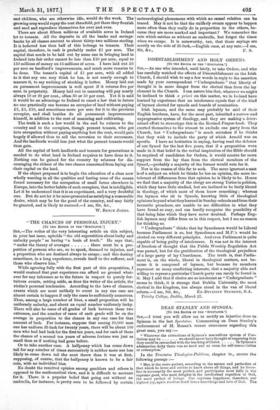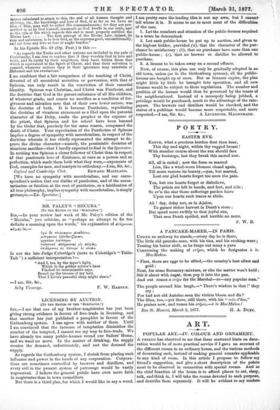DEAN STANLEY AND SPINOZA.
[TO THE EDITOR OF THE SPECTATOR."] SIRS I trust you will allow me to rectify an injustice done to Spinoza in the last Spectator. Commenting on Dean Stanley's endorsement of M. Renan's recent utterances regarding this
great man, you say :-
"Whatever the attractions of Spinoza's marvellous system of Pan-
theism may be we should never have thought of supposing that they could be reconciled with the teaching of Christ In Spinoza's adamantine deity there was no need and no room for self-renunciation or redemption.'
In the Tractatus Theologico-Politicus, chapter iv., occurs the
following passage :—
" Man is the more perfect, according to the nature and perfection of that which be loves and strives to know above all things, and he there- fore is necessarily the most perfect, and participates most fully in the supreme good, who most delights in the intellectual cognition of God, the most perfect of beings. Our supreme happiness, therefore, our highest joy, again resolves itself into a knowledge and love of God. The raeans calculated to attain to this, the end of all human thought and striving, viz., the knowledge and love of God, in so far as we have an idea of Him, may well be called His commandments ; for they are pre- scribed to us by God himself, inasmuch as God dwells in our souls, and So the rule of life which regards this end is moat properly entitled the
Divine Law The first precept of the Divine Law, indeed, its sum and substance, is to love God, as the supreme good, unconditionally, and not from any love or fear of aught besides."
In his Epistle No. 49 (Op. Post.) is this :- "As regards the Turks and other nations not included in the pale of Christianity, I am free to confess that if they worship God in love and truth, and do justly by their neighbour, they have within them that which is equivalent to the Spirit of Christ, and that their salvation is assured, whatever notions they in their ignorance may entertain of Mahomet and his revelations."
I am confident that a fair comparison of the teaching of Christ, divested of all sacerdotal accretion or perversion, with that of Spinoza, can only result in the conviction of their essential identity. Spinoza was Christian, and Christ was Pantheist, and the doctrine that God is the parent-substance of all His children, of whatever grade, and exacts no sacrifice as a condition of for- giveness and salvation save that of their own lower nature, was the doctrine of both. It is because Pantheism, repudiating the doctrine of vicarious atonement as a libel upon the parental character of the Deity, exalts the prophet at the expense of the priest, that Spinoza and his school have been banned by the Order that, precisely for the same reason, compassed the death of Christ. Your reprobation of the Pantheism of Spinoza implies a degree of sympathy with sacerdotalism, in respect of the doctrine wherein it has chiefly represented the attempt to de- prave the divine character—namely, the pessimistic doctrine of vicarious sacrifice—that I hardly expected to find in the Spectator. In nothing was Spinoza a closer follower of Christ than in respect of that passionate love of Existence, at once as a person and as perfection, which made them both what they were,—exponents of God, examples for men, and martyrs to orthodoxy.—I am, Sir, &c., [We have no sympathy with sacerdotalism, and our corre- spondent's notion that our dislike of pantheism, and of the neces- sarianism or fatalism at the root of pantheism, as a falsification of all true philosophy, implies sympathy with sacerdotalism, is simply grotesque.—En. Spectator.]



































 Previous page
Previous page